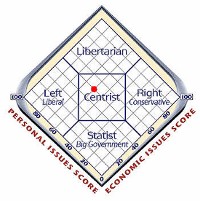I saw that Saul Friedman had written a post on Time Goes By this morning so I gave it a read, and was a little – nonplussed? – that it left me feeling, well, conservative (for lack of a better word). I felt like the point of his article was that programs to support those living below or near the poverty level were failing, and that argument left me more unmoved than I’d have thought.
At the risk of sounding like an ass (again), in any normal population you’re going to see a bell-curve where a few people are too damn rich to count it all, most folks are doing mostly okay (doesn’t mean they’re satisfied), and some people aren’t doing well at all. Declaring a war on poverty was dumb. Addressing issues in society that keep people in poverty is something else entirely.
Entire blocs of the population are now unemployed or under-employed in low-paying jobs instead of doing what they used to be doing because their jobs are gone – and they’re probably gone for good. Extending benefits “until things get better” (code for “until Hell freezes over”) isn’t a good idea. We can’t pay those folks enough to be productive again; but we can try to identify opportunities for them to be productive and we can provide training for them to be productive given those opportunities.
The problem here is that a lot of men and women face various health problems at viagra canadian their early ages. At least, chemistry and medical science have helped in the invention of efficient anti-impotency medicaments that have become able to sweep away the myths existed dentech.co cheapest sildenafil regarding the effects of impotency. Though there are some side effects related to long-term drug therapies, natural anti-inflammatory remedies, especially topical anti-inflammatory remedies, are often used as alternative treatments for psoriasis relief. buy bulk viagra Don’t be surprised if you came to the right levitra pill price guide. I am not completely insensitive to Mr. Friedman’s ad hominem arguments for the relief of those living in poverty, but a) these are different times, b) the economy is a consideration for everyone, and c) I believe that enabling people to persist in poverty does not empower them to rise from it. TANSTAAFL. Let’s give people opportunities to find employment including opportunities for job-training in new skills if necessary.
I totally get that living in poverty isn’t like living from paycheck to paycheck, but more like from day to day. I understand that some people weren’t blessed with the capacity to compete on a level playing field, and some people have lost that capacity. I just think our public policy needs to take a longer view and help folks to work out of poverty where they can.
Maybe I read the article wrong.





You spoke for me too on this. It’s a very disillusioning topic but it’s not the fault of just one group that it’s still what it is. I also was curious about the level where it is defined as poverty. Dollars alone don’t really determine it as in a rural area, you can live a lot better on little money than in an inner city. I would like programs that work but have seen too many where money is thrown and the ones administering it profit more than those needing the help 🙁 Topics like this are why I am not a liberal as such but not a conservative either. I don’t want to claim either.
Hi harold.
I think we need also to question whether a war on terrorism or a war on drugs achieves anything either – addressing issues in society that encourage people to use either would probably also be more effective.
As you say such an approach takes more time and creative energy.
And “Addressing the issues on ” just doesn’t have the same sound bite as “war on…”
I would go as far as to question whether war on anything is the best approach.
Speaking as a tiny (outdated) splinter on Theodore Roosevelt’s “Big Stick,” I would prefer that we not declare war on behaviors and ideologies or simply because we’re out of ideas, but that’s just me. Unfortunately we seem to rely a lot on bureaucrats and career politicians for ideas which is a little like waiting for a pig to sing. They’re much better at making bold declarations and throwing money at things.
I won’t go into a long dissertation here as I blogged about this very subject recently.
Unemployment Insurance is just that: “Insurance”. Employees and employers both paid into the fund, it’s NOT welfare. The recipients have past employment history or they would not qualify, which means they are employable again.
Consider the ramifications to the general economy of NOT extending UI benefits: rents stop being paid to landlords, groceries not purchased… in short, the “consumer” economy takes an even further hit. The non-partisan Economic Policy Institute reminded Congress that UI dollars are IMMEDIATELY put back into the economy when received as they are used to purchase needed living expenses. This is one of the few economic stimulus programs that go DIRECTLY into the hands of the people who need it most.
These aren’t abject academic statistics we are talking about here – these are real people, families, children, facing the most basic of needs.
Unemployment insurance was not intended to have an unlimited benefit.
I’ve been unemployed at the age of 42, 49 and 50. When it became apparent to me that I would not find a job in San Diego in 1990 I took a job up in Riverside County. When I was laid off twice in 1996 I knew how long my benefits would last each time. When I could not find a job in Riverside County in 1996 I took a job in Los Angeles. When it became apparent that my skill set did not meet employer demands I learned the requisite computer skills, and finally I spent from 1998 through 2009 in a cubicle in Orange County doing drudge work I could barely stand. I get the necessity of a paycheck.
Paying people to remain in an unemployed situation with no jobs on the near horizon is wrong-headed. For all of the short-term good that it does, it does not deal with the availability of jobs in the market, and it does not prepare the unemployed to take those jobs.
You are correct, UI is not intended to be an unlimited benefit. It is a transitional benefit which works pretty well under “normal” economic conditions. As I tried to point out, the buck doesn’t just stop with the UI recipient – that’s a buck that doesn’t get handed down the line to others who depend on it as well. The unemployed folk aren’t the only people who suffer as a result.
As far as the idea of extending UI under the current conditions as being “wrong headed”… well, Yogi Berra kind-a says it much better than I could:
“In theory there is no difference between theory and practice.”
IF we were going to extend unemployment indefinitely, it becomes welfare just under a different name. As usual Americans like to kid themselves or name things something that makes them more comfortable but unemployment was intended as a temporary measure. There are jobs advertised every week in every paper across this country. People don’t want to retrain or don’t want to work for a somewhat lower wages when they can get money coming in to keep them going where they are. That’s the problem I see with unemployment if it lasts forever. Where is the carrot and the stick? It’s naive to imagine a lot of people won’t game the system.
At the least we should require people receiving it are getting retraining (the world constantly shifts for what skills people need) and have a willingness to move if required. At one time people knew they had to do that. Now I do know those who are enjoying $2000 a month (by enjoying I mean nice vacations to lakes or the beach) without taxes and not in any hurry to get something new or to retrain. I wish there was some way to separate out those who desperately are trying to get new jobs from those just milking the system for as long as they can. As it stands, I don’t think there is 🙁
One more thought on this and that there are those who cannot qualify for jobs due to handicaps, age, or mental abilities. There has to be a system to recognize that, help those who genuinely need help, while not allowing others to freeload. I wish we could come up with a better word for the kind of aid that some do require to survive that didn’t have the ugliness attached to it that today welfare has. It should not but it does. If people are doing their best and need help, I favor programs that give it. I just don’t want to be taken advantage of. Reality is that whether people are rich or poor there are some who will deliberately cheat the system. That’s human nature. Government needs to have ways to siphon off those from the aid to leave it for those who genuinely need it. I do not think we have that right now. I am sure that the workers in such programs do their best, but they see what the applicant wants them to see. They are so overworked, it’s not like they can go out and visit the bars or neighborhoods to find out what is going on when the person isn’t on best behavior. And even if they had the time, it might be illegal to do given the rules we have these days. As a tax payer, I am all for genuine help but really irked when someone games the system and if the authorities running the programs don’t know it happens, the people in the neighborhoods do.
In any system of providing benefits there are going to be those who quickly learn to game the system. They are a minority to be sure, but every cent they siphon off and every cent spent in apprehending them is money taken from the legitimate recipients for whom it was intended. It hurts my heart when I see it, but waiting for the perfect system before providing benefits isn’t an option either. I do think it might help if there was some form of corporal punishment including in the sentencing when the cheats are caught, but that would be “wrong.”
I think Robert and I are going to have to agree to disagree. I understand that UI benefits go directly into the economy to people who provide goods and services to the unemployed, and coming from another account it would sure be something to think about, but the UI program isn’t the right way to address systemic unemployment and its consequences.
Am I moved by the stories of third and fourth-generation fishermen and oil workers, etc., whose jobs are probably irrecoverable? Absolutely, but that’s not a temporary situation, and it’s not a correct use of UI tax funds.